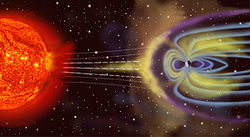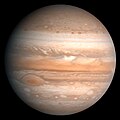Planetary science
Planetary science (or planetology) is the organized study of planets, which are relatively large, stable bodies in orbits around stars.
The planet best known to us is the Earth. There are seven other major planets in the Solar System. The Solar System also has dwarf planets, such as Pluto and Ceres, the largest asteroid.
Space probes have gone near or landed on all planets in our solar system. In recent decades better telescopes have found planets in solar systems other than our own, which are known as exoplanets. One of the first was a planet found to be orbiting Barnard's star.
Planetary science is a part of astronomy and geology. It is sometimes referred to as planetary geology.
Planetary science in a broad sense includes finding a planet's orbital period and orbital distance from its star, the mineral makeup of the planet, and an attempt to learn its age. It may also have a more narrow focus, such as the mapping of the planet's surface features and the makeup of its atmosphere.
| Wikimedia Commons has media related to Lua error in Module:Commons_link at line 62: attempt to index field 'wikibase' (a nil value).. |
Planetary Science Media
A geological map of the Sputnik Planitia basin on the dwarf planet Pluto. Analysis of planetary surfaces and surface features is a major component of planetary science
The solar wind is deflected by the magnetosphere (not to scale)
Cloud bands clearly visible on Jupiter.
Other websites
+{{{1}}}−{{{2}}}


